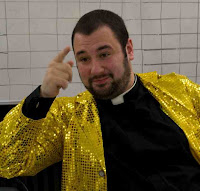Any of my Followers or Readers who have been reading this blog for a while will know that I sometimes seem to irritate – no, seem to offend the liturgical sensibilities – of a number of other people; and I am sure that many others will find the apparent ‘disputes’ extremely unclear . . . which is why I’m going to try and clarify things a little in this post, and perhaps also clarify my own position to those who sometimes seem to feel that I’m not reasonable.
The point at issue is, generally speaking, ‘liturgical taste’ : because whilst I’m not denying that there are those for whom there are serious theological questions involved in the decisions of various Popes on liturgical points, those tend to be very much more complex and recondite – and much more open to debate as to validity and relevance – than the discussions on the more general question.
This may be seen as the fact that there are those who seriously dislike what is generally known as ‘ultramontane’ liturgical taste : ‘Roman’ vestments, birettas, lace on albs and cottas, and things like that . . . such people probably prefer full Gothic vestments, plain or embroidered linens, and bare heads.
What may surprise them is that I have no problems with any of those things . . . in the right place.
My problem is that to force the London Oratory, for instance, to introduce Gothic vestments, and to eliminate lace cottas for servers in favour of either full surplices or apparelled albs, all in pursuit of the ‘Gothic style’, would simply be ridiculous, because the Gothic image is one which relates to an appropriate architectural style as well . . . but I’m perfectly happy to accept that, in a setting that is ‘Gothic’ in style, this would certainly look as good as, and very probably better than, the ‘Roman’ taste : and I’m also quite happy to accept that for a Pope to insist that one should never use Gothic vestments, but only ever Roman ones, probably is an inappropriate application of papal authority.
I suppose, to be honest, my position is that I want liturgy to have a visual and audible integrity.
I’m really not happy about Masses which include all sorts of liturgical odds and ends . . . I mention no names, but I can remember a priest who used to be in a C13 church with very find Gothic architecture, and a fine collection of Gothic vestments, who decided that he preferred lace albs : and nothing has ever looked so ridiculous; especially when he also decided that he preferred an electronic keyboard to the decent pipe organ, and the hymns of C20 to either plainsong or The English Hymnal.
The resulting dog’s dinner of a Eucharist looked silly, sounded silly, and discouraged a great many members of a long-standing congregation. Fortunately it wasn’t long before he moved on, and things went back to ‘normal’ : but it just hadn’t been a wise or helpful thing to have done.
My position is that if you have a
true Gothic church then you may well be best to stick to Gothic vestments – and appropriate linen; and the liturgical style should reflect the surroundings. ‘Modern liturgy’ simply doesn’t work well in medieval architecture . . . and more than medieval liturgy is necessarily appropriate in modern surroundings (although I accept that much ‘modern architecture’ is actually so neutral that you could get away with anything !).
What this means, of course, is that I love the liturgy of the London Oratory because it is so clearly what the Church was designed for : and the fact that what happens at Blackfriars, Oxford, is very much simpler and severer is entirely right, because that is what the surroundings are . . . and they are just as appropriate for the Dominican ethos as those of the London Oratory for the Oratorian one. Similarly, the illustration above - which was taken for an Alcuin Club publication very many years ago in S. Cyprian’s, Clarence Gate, show how absolutely
right a completely Gothic integrity is . . .
Of course, my position also means that my commentators who dislike a particular style
as such, and feel that I am encouraging it
as such have got me wrong : because I’d be just as horrified at an ‘Oratory-style’ High Mass at Blackfriars as I would at a Blackfriars-style celebration at the Oratory.
Horses for courses, I suppose, is what it boils down to.
























